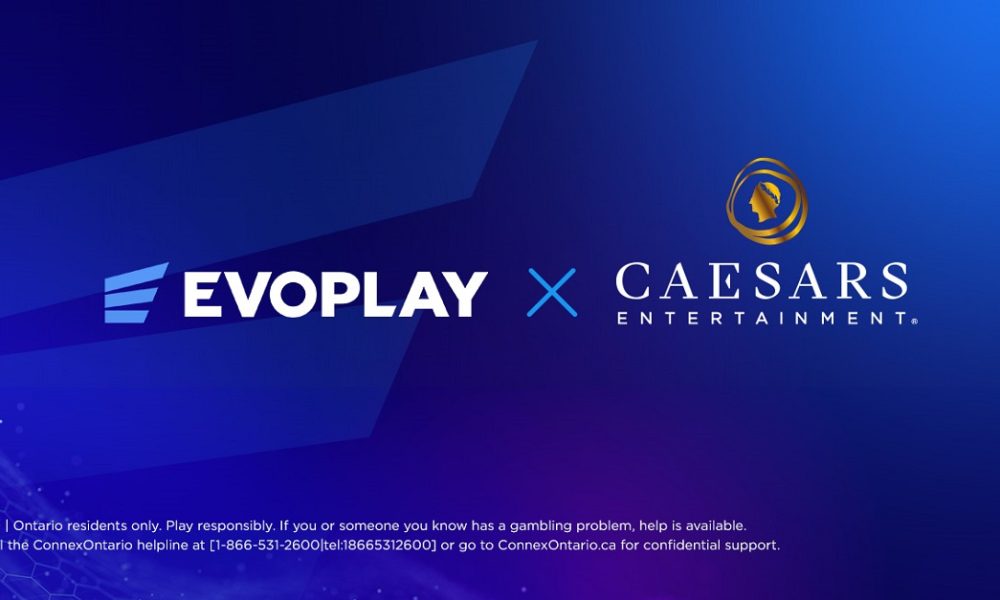

Canada
Getting ready for Ontario! Exclusive Canada interview with Evoplay
As one of the industry’s most innovative gaming studios gets ready for North America, we sat down with Evoplay’s superstar CCO, Vladimir Malakchi to talk through their exciting plans for the continent, and why Ontario can be one of the industry’s most exciting new opportunities for 2022 and beyond.
With Ontario set to be one of 2022’s biggest opportunities in North America – what is Evoplay looking to bring to the table in Canada?
Canada’s gambling industry is currently developing at a faster rate than Europe’s various regulated markets, with player preferences also changing at a rapid rate. We communicate with operators who are already live in the country, and they confirm that Canadians are in search of innovation and engaging forms of entertainment, which aligns with our direction in terms of product development.
It is well known that Canadians are enthusiastic gamblers, with around 75% of all Canadians happy to give casual gaming a try as entertainment. These activities tend to be associated mainly with scratch cards and sports betting, as they tend to deliver the maximum level of anticipation and built excitement around each win. For this reason, roughly 36% of Canada’s gaming demographic prefers scratch cards, while only 22% choose casino entertainment.
This is where our pioneering portfolio comes into play, meeting the interests of a vast selection of Canadian players with our sports-themed titles and instant games. We have already prepared a superb football pack that will undoubtedly hit the spot, while our team has continued to work on eye-catching betting mechanics to fulfil the requirements of even the most seasoned bettors.
Talk us through Evoplay’s take on the Canadian slot scene – how much does it differ to the land-based heritage of the US?
At its root, the land-based scene stands at odds with the majority of markets. Canada’s iGaming industry originated from a rich culture of brick-and-mortar casinos, but its notably high-tech-oriented population has influenced the development of online gaming in the region considerably.
With Canadian players interested in cutting-edge technologies, they are more demanding of high-quality gamification, graphics, and entertainment than the average player. Since Evoplay has always been known for its innovative approach to game design in all types of games, we know where we stand with the audience and are aware of where we need to be to keep them engaged.
How do you see Evoplay’s extensive experience entertaining players in Europe and LatAm adapting to the Canadian market?
We always align with data when entering any new market, following the same protocol with Canada as we would going live in any other region. We are aware of its most common trends, though a deeper insight into players’ preferences will only be possible through partnering with operators that serve the Canadian market. Such insight will allow us to see a clearer picture of how we can adapt our products to make them even more attractive to Canadian audiences.
How fast do you see the Ontario market liberalising itself for players and operators? How can games studios differentiate themselves in what will be a highly competitive market?
With around 40% of the country’s population situated in the city, Ontario is a market with fantastic potential. According to the surveys, its GGR will be approximately $1.25 billion this year, with the tendency to rise to $1.84 billion in 2023 and $2.54 billion in 2026.
Like many other countries, Canada has various restrictions surrounding advertising and responsible gambling which are unlikely to be lifted anytime soon, but it still leaves a lot of capacity for industry development.
The launch of Canada’s iGaming market in April unleashed the floodgates, with many providers flapping to be one of the first to cast the line in this highly advantageous province. However, speaking from experience, less than half of them will have long-term stints in the market. In the meantime, we will continue to deliver state-of-the-art products that resonate strongly with players of all demographics.
Last but not least – vision 2024: what’s Evoplay’s plans for going live in both the US and Canada within the next two years?
Both markets arrive with their list of challenges surrounding legal issues, but we are now at the stage of active dialogue and laying the groundwork, and if one thing is for sure, it is that our products are extremely attractive to players in region.
As game developers go, we are very unique. The vast majority of providers can’t deliver the same level of quality and entertainment as us, and certainly not in the same timeframe that we are able to, which is extremely important for such a demanding demographic of player. I’m sure they’ll be a big part of our plans for many years ahead!
Canada
absolutebet Secures AGCO Registration as an Internet Gaming Operator in Ontario

Internet Gaming Operator by the Alcohol and Gaming Commission of Ontario (AGCO).
This significant milestone authorizes absolutebet to offer regulated iGaming services in Ontario’s legal market under the oversight of AGCO and iGaming Ontario (iGO).
The registration marks a key step in absolutebet’s mission to bring a trusted, responsible, and innovative online casino experience to Ontario players. absolutebet is committed to operating with integrity and transparency, meeting all provincial standards for player protection, responsible gambling, anti-money laundering, and game integrity.
“Securing AGCO registration is more than a milestone—it’s the start of absolutebet’s journey in one of the most exciting regulated markets in the world,” said Chen Truman, Founder of absolutebet. “We are building a brand that will grow with the Ontario community and set the stage for future expansion.”
On the regulatory milestone, Krisztina Kalla, Legal & Regulatory Compliance Advisor of absolutebet, commented: “I’m incredibly proud to see all the hard work behind this license pay off. Securing AGCO registration has taken months of preparation and close collaboration with regulators and partners. I am very happy to see the result of that work, and even more excited as we move into the launch phase and open up the absolutebet community to Ontario players in a fun and responsible way.”
Ontario is recognized as one of the most competitive and fast-growing regulated iGaming markets in North America. With AGCO registration secured, absolutebet will move forward with the final stages of its iGO onboarding process in preparation for launch.
The post absolutebet Secures AGCO Registration as an Internet Gaming Operator in Ontario appeared first on Gaming and Gambling Industry in the Americas.
Alex Malchenko Head of Sales at Evoplay
Evoplay strengthens Ontario presence in partnership with Caesars Entertainment

Evoplay, the award-winning game development studio, has partnered with Caesars Entertainment to expand its footprint in the Canadian market, following its initial entry earlier this year. The partnership integrates 20 of the studio’s top-performing titles onto Caesars Palace Online Casino, Horseshoe Online Casino and Caesars Sportsbook & Casino in Ontario, including fan-favourites such as Hot Triple Sevens, Triple Chili, and The Greatest Catch Bonus Buy.
Having announced its official entrance into Ontario in March, the collaboration with Caesars marks a significant step in Evoplay’s local strategy. Further standout releases, such as Inner Fire Bonus Buy and Hot Volcano, also launched as part of the initial package, with additional player favourites, including Fruit Nova and Ice Mania.
The collaboration underlines Evoplay’s commitment to working with leading operators to deliver high-quality content tailored to regional audiences.
Alex Malchenko, Head of Sales at Evoplay, said: “Launching with Caesars in Ontario marks a key milestone in our North American strategy.
“It reflects both the strength of our portfolio and our commitment to providing innovative, high-performing content to operators of the highest caliber.”
Ricardo Cornejo Rivas, Vice President of Online Gaming at Caesars Digital, said: “Evoplay brings a fresh and dynamic approach to online gaming, which we’re excited to offer to our players in Ontario. This portfolio of standout titles adds to our growing content library and furthering our ongoing goal of delivering top-tier entertainment experiences to our players.”
The post Evoplay strengthens Ontario presence in partnership with Caesars Entertainment appeared first on Gaming and Gambling Industry in the Americas.
Canada
iGaming Ontario Appoints Joseph Hillier as its New President and CEO

The iGaming Ontario Board of Directors has announced Joseph Hillier as the organization’s new President and Chief Executive Officer, effective September 8, 2025. Joseph’s depth in the Ontario igaming market combined with successful public and private sector careers make him the ideal President and CEO at this critical point in iGaming Ontario’s growth.
Joseph was most recently Chief Strategy Officer and Corporate Secretary at the Alcohol and Gaming Commission of Ontario (AGCO), where he delivered significant strategic and regulatory initiatives across the province’s alcohol, cannabis, gaming, and horse racing sectors. Prior to the AGCO, he served as Chief of Staff to Ontario Attorney General Hon. Doug Downey and led the development, launch and implementation of Canada’s first private sector-driven igaming market and the creation of iGaming Ontario. Joseph also spent more than a decade working in the financial and legal services sectors.
The Board expressed its sincere thanks to David Smith for serving as Interim President and Chief Executive Officer since Martha Otton’s retirement.
The post iGaming Ontario Appoints Joseph Hillier as its New President and CEO appeared first on Gaming and Gambling Industry in the Americas.
-

 gaming3 years ago
gaming3 years agoODIN by 4Players: Immersive, state-of-the-art in-game audio launches into the next generation of gaming
-
EEG iGaming Directory8 years ago
iSoftBet continues to grow with new release Forest Mania
-
News7 years ago
Softbroke collaborates with Asia Live Tech for the expansion of the service line in the igaming market
-
News7 years ago
Super Bowl LIII: NFL Fans Can Bet on the #1 Sportsbook Review Site Betting-Super-Bowl.com, Providing Free Unbiased and Trusted News, Picks and Predictions
-
iGaming Industry8 years ago
Rick Meitzler appointed to the Indian Gaming Magazine Advisory Board for 2018
-
News7 years ago
REVEALED: Top eSports players set to earn $3.2 million in 2019
-
iGaming Industry8 years ago
French Senator raises Loot Boxes to France’s Gambling Regulator
-
News7 years ago
Exclusive Interview with Miklos Handa (Founder of the email marketing solutions, “MailMike.net”), speaker at Vienna International Gaming Expo 2018







